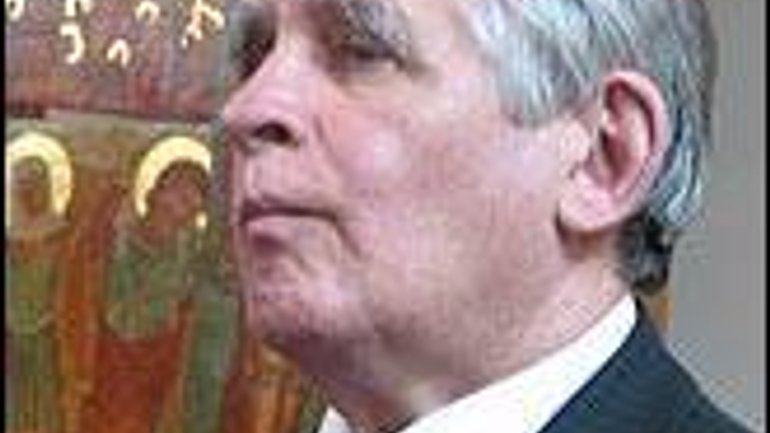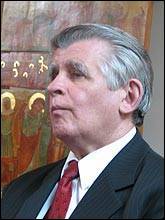“The Bible should reflect the idea of Christ, and the idea of Christ is the same for all.”

 Interview with Bishop Vasyl BOYECHKO of the Church of Evangelical Christians in Ukraine
Interview with Bishop Vasyl BOYECHKO of the Church of Evangelical Christians in Ukraine
Correspondent: At the end of this year “The Bible with Commentary for a Full Life,” edited by Bishop Vasyl Boyechko, will be published. The work of compiling this book lasted a full 15 years. Bishop Boyechko explained that he began the work from a publication of American missionary Donald C. Stamps, who is the author of complete commentaries for a new publication of the Bible. At the same time, with the help of the Church of Evangelical Christians in Ukraine (CECU), a Bible concordance is being prepared for publication. The compilers expect that the Bible, which is being printed in Minsk, Belarus, and the concordance will come out at the same time.
–Bishop Vasyl, what is the main source that you used in compiling this new publication of the Bible with commentary?
– Bishop Vasyl: The fundamental text in this Bible is the translation of Panteleimon Kulish, because among all translations, in my opinion, this is the best, though it has certain essential weaknesses, the preservation of Church Slavonic and Greek idioms, and even words absent from the modern Ukrainian language. But inasmuch as Panteleimon Kulish and his co-workers Ivan Nechui-Levytskyi and Dr. Ivan Puliui translated from Old Church Slavonic, this translation is the most successful and closest to the original.
Preparing a new Bible, I used all the existing Ukrainian translations in order to put them side by side and choose the best. We translated articles and commentaries from the English book “Full Life Study Bible,” so the basis was the King James version of the Bible. So, this Bible has two main bases: the Kulish Bible and the King James Bible. But in the process of work I referred to German, Czech, and Polish publications, and, of course, the Greek. Though I am not fluent in Greek, we invited specialists to cooperate. We checked some very problematic places according to the Hebrew Bible.
– Whose commentaries and articles are included in this publication?
– This book has articles and commentaries by Donald C. Stamps, a noted American theologian. As the editor, I had the right to make corrections. I made approximately 20 substantial corrections. But the articles are a masterpiece, 45 for the New Testament and 105 for the Old Testament. It happened that in November 1991 when I was in the USA the World Union of Christian Publishers assigned me to work on this Bible, the month when theologian Stamps died. So I never met him.
– Are the deuterocanonical books contained in this publication of the Bible?
– In view of the fact that the deuterocanonical books contain many questionable items, in order that people not become excessively interested and embrace questionable histories, we did not present them in the Bible. Though some items are authentic, for example, the Book of Maccabees is authentic.
– When will the Bible be published?
– It should come out by the end of March, and on 27 April an official presentation is planned in Kyiv, the next day at the Ostroh Academy. There my work is regarded as that of a doctor of theology; finally, this is one of the oldest institutions of Ukraine for theological research and education.
– Bishop Vasyl, you are giving a Bible course at the master’s program in ecumenical studies, which is jointly run by the Ukrainian Catholic University and Ivan Franko National University in Lviv. So, how do you see the model for ecumenism today in Ukraine?
– Each church belongs to the body of Christ, each church is a part of the universal church. In principle, this is correct, because Christ founded one church and it is leading to one goal. But today this can be concealed because some Christian communities have left the fullness of the Gospel and substituted it with their own doctrines, and so it is understood that the question should be posed here: Can such a church be called a member of the body of Christ? Though no one today makes such accents.
I have two proposals:
— each church should present its dogma, its creed, in the light of the word of God. For there are two foundations to the church of Christ: faithfulness to the word and faithfulness to the Spirit;
— The second very important element is that the churches should repent before each for sins that have separated the church over the centuries. The late Pope John Paul II, who had great courage to state before the whole world the truth that the church was not always correct regarding the Jews and the ideology of fascism, showed an example of this. I admire such people who have the courage to admit their mistakes.
– And what is the role of the Bible in the context of ecumenism?
– The Bible is a book upon which no one can infringe or introduce his own denominational motives, but, as we see, there are such sins. There is a special Bible published by the Jehovah’s Witnesses which throughout emphasizes their doctrinal convictions. The Bible edited by Ivan Khomenko (the Vatican edition) is considered the Ukrainian-language basis for the Catholic Church and there some tendentious features are permitted, from which one can understand the Catholic Church is defended. Ivan Khomenko himself, when he saw the Vatican editing, was very upset, because the editors tried to put in their own correctives there.
The Bible cannot and does not have the right to be denominational. So in Ukraine exists the Ukrainian Bible Society, which joins 10 Christian denominations, and which coordinates Bible texts with special theological commissions. The Bible should reflect the idea of Christ, and the idea of Christ is the same for all.
– You also head the Christian mission Rebirth and Mercy…
– Yes. The goal of our activities is to spread the ideas of Christ. We are involved in publishing and in the humanitarian sphere. We try with all the means possible for us to defend the needy, especially young orphans and street children. Now in the city of Vinnyky, on the basis of a former military town, we are preparing a great Christian House of Mercy, for young orphans and children from poor families.
RISU note: Vasyl Boyechko is a bishop of the Church of Evangelical Christians in Ukraine (CECU), a member of the Main Committee of the CECU in Kyiv, has a doctorate of theology from the Latin University of Theology in California and a doctorate in religious studies from the Ostroh Academy National University. He also teaches at UCU’s master’s program in ecumenical studies, and for 15 years has been the host of the television program “Eternal Source” on Lviv region television. Bishop Vasyl heads the Christian charitable mission Rebirth and Mercy. He is the author of eight books, including “Gifts of the Holy Spirit” (on Christian pneumatology), “Eschatology of the Church,” “The Truth about Charism,” “Marriage is from Heaven,” and “Traditions in the Light of the Word of God.”
Lidia HUBYCH and Tetiana LUSTYK conducted the interview in Lviv on 21 March 2007.









